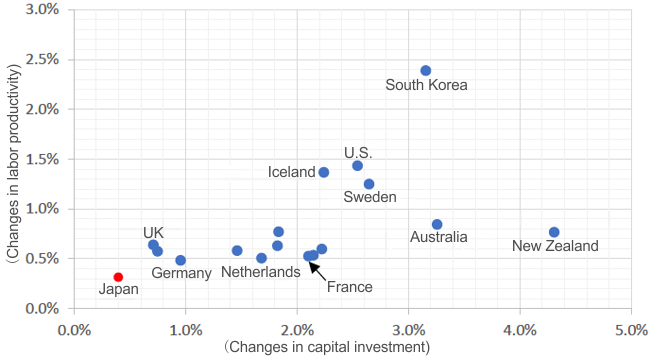Consumer Prices Expected to Stay High
Because of the prolonged COVID-19 crisis, the Russian invasion of Ukraine, and the economic sanctions imposed against Russia, supply constraints have emerged with respect to some goods and energy and other resources, fueling global inflation. Japan is no exception, with corporate goods prices in the country recording a particularly steep rise. The Corporate Goods Price Index, which has stayed above 9% since January 2022, is registering the highest growth since 1980, when the second oil shock took place.
A large portion of the rise in corporate goods prices is passed on to consumer prices in principle, albeit to varying degrees. If the sanctions against Russia remain in effect, the global supply crunch for food, energy and other resources and upward price pressures will continue in the medium term. If that happens, consumer prices in Japan are also likely to continue recording high growth.
Even so, the current inflation is due to “cost-push” factors, such as price increases in energy, grains, and mineral resources. On the other hand, the supply-demand gap in Japan reflects a large demand shortage compared with the situations in other major countries (OECD, “Economic Outlook”), which means that demand-side factors are not strong enough to push up prices. As a result, even though prices may remain high, the inflation rate in Japan is expected to stay relatively low compared with the inflation in other major countries.
Price Rise, Wage Hike, and Economic Stability Provide a Solution
However, the main problem for Japan is that due to a lack of income growth for the Japanese people, growth in purchasing power is not keeping pace even with the relatively low inflation rate. Indeed, over the past 10 years, the value of per-capita total cash earnings has grown minimally, by less than 0.1% per year on average. As a result, despite the relatively low inflation rate, real wages have continued to record negative year-on-year growth (Ministry of Internal Affairs and Communications, “Monthly Labour Survey”).
There are also concerns that the inflation may affect fiscal expenditure. If the inflation continues under low economic growth, leading to a rise in government bond yields, the government’s debt-servicing cost will increase accordingly, a situation that could squeeze the fiscal balance and increase fiscal rigidity further.
However, the impact of inflation on the fiscal balance is not entirely negative. Inflation works to raise business sales and salaries in nominal terms, bringing additional tax revenue. In light of the correlation between nominal GDP and tax revenue since FY2000, if the nominal economic growth rate in FY2022 exceeds the growth rate projected under the initial budget by 1 percentage point due to the effects of inflation, total tax revenue, including consumption tax, corporate tax, and income tax, will increase by slightly under 3 trillion yen compared with the initially projected level. This appears to suggest the possibility that small increased in the interest rate under inflation may not cause the fiscal balance to deteriorate, so long as the economic situation remains stable.
From that perspective, on the price front, it is desirable that the upsurges in prices of energy, food and mineral resources be brought under control early. However, if prices remain high, it is desirable to raise the people’s income and maintain stable economic growth so that the inflation can be overcome. If interest rates remain stable, there is ample possibility that the fiscal balance may improve due to a tax revenue increase.
What Should Be Done to Overcome Inflation and Achieve Fiscal Consolidation
In order to increase the people’s income and improve the fiscal balance so that inflation can be overcome, it is most important that companies increase earnings and improve productivity, which forms the basis of wage growth. Fortunately, the yen’s real effective exchange rate is at the lowest level in 50 years, while the Bank of Japan’s “tankan” report on short-term business sentiment shows that major exporting companies are revising sales projections sharply upward.
The remaining challenge is whether or not Japanese companies will sufficiently benefit from the yen’s historic depreciation and be able to implement the necessary wage hikes. Regrettably, in recent years, although Japan has appeared to be riding on the wave of globalization, it has actually experienced an extreme degree of economic hollowing-out. While the overseas production ratio has continued to rise, growth in domestic investment has remained slow due to the low fertility and aging society. Moreover, in terms of the value of inward foreign direct investment (FDI), Japan is near the bottom of the global rankings, although FDI from abroad is supposed to have made up for the stagnant domestic investment by Japanese companies. As a result, between 2000 and 2021, industrial production declined 8%, the per-capita capital equipment ratio (real capital stock per employee) fell 7% (data from the European Commission), and labor productivity growth was only 0.3%, the lowest rate among the major developed countries.

Source: OECD, “Economic Outlook”
For the Japanese economy to overcome the cost-push inflation and for the Japanese people’s living standards to be maintained and raised, an increase in corporate earnings and productivity growth are essential. What is now necessary for dealing with the inflation, with an eye to future fiscal consolidation, is that Japanese companies increase capital and human resource investments and create more value added. There has been an encouraging announcement that the value of domestic investment by major Japanese companies in FY2022 will increase sharply, by 26.8%, compared with the previous year (Development Bank of Japan, “Survey on Planned Capital Spending”). Given that the yen’s recent depreciation is a historic development, I hope that the public and private sectors will work together in dealing with the current situation, including by creating an environment that is conducive to active business investment in the form of institutional assistance.


